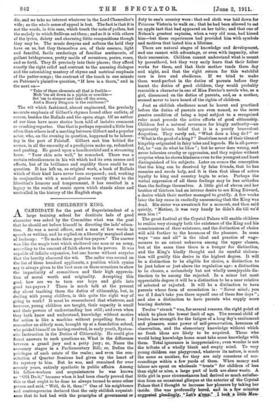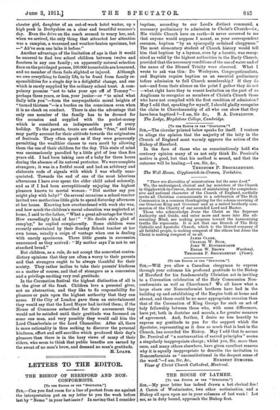THE CHILDREN'S KING.
ACANDIDATE for the post of Superintendent of a large training school for destitute lads of good character was asked by the Committee what was the goal that he should set before himself in directing the lads' educa- tion. He was a naval officer, and a man of few words in speech or writing, and he replied On a liberally margined sheet of foolscap : "To make them good tax-payers." The answer was like the magic tent which sheltered one man or an army, according to the amount of faith shown in its powers. It was capable of infinite expansion, but one learns without surprise that the brevity obscured the wit. The sailor was second on the list of three hundred applicants, a position which cynics say is always given to the best man on these occasions to show the impartiality of committees and their high apprecia- tion of moral worth and originality. Accepting this goal, how are we to turn our boys and girls into good tax-payers ? There is much talk at the present day about teaching them the duties of citizenship, but, in dealing with young children, is this quite the right way of going to work? It must be remembered that whatever, and however, young children are taught, their capacity is small and their powers of understanding less still; and even when they both know and understand, knowledge without motive for action is like a machine without propelling force. I remember an elderly man, brought up at a foundation school, who prided himself on having received, in early youth, System- atic Instruction in the Duties of Citizenship. He could give fluent answers to such questions as, What is the difference between a grand jury and a petty jury; or, Name the necessary stages in a Parliamentary Bill; or, Define the privileges of each estate of the realm; and even the con- stitution of Quarter Sessions had given up the heart of its mystery to him. But he was, and remained for over seventy years, entirely apathetic in publics affairs. Among his fellow-workers and acquaintances he was known as "Old Do-it," because when it had been clearly proved that this or that ought to be done he always turned to some other person and said, "Well, do it, then!" One of his neighbours and contemporaries declared that the only childish acquaint- ance that he had had with the priaciplea of government or duty to one's country were : that red cloth was laid down for Princess Victoria to walk on; that he had been allowed to eat an apple tart that had appeared on her table; and that one of Nelson's greatest captains, when a very old man, had kissed him—but these experiences had provided him with symbols and motives that lasted him a lifetime.
There are natural stages of knowledge and development, and one cannot with advantage, or even with impunity, alter their succession. Children cannot understand what is meant by parenthood, but they very early learn that their father works for them, and that their mother tends them day and night, and that the right return for this watchful care is love and obedience. If we tried to make them word-perfect in the duties of parents before they learnt the duties of good children, they would probably resemble a character in one of Miss Ferrier's novels who, as a girl, discoursed on the duties of parents, and, as a mother, seemed never to have heard of the rights of children.
Just as childish obedience must be learnt and practised before the duties of parents are even named, so the more passive condition of being a loyal subject to a recognized ruler must precede the active efforts of good citizenship. Children feel a natural reverence_ for kingly authority—an apparently inborn belief that it is a purely benevolent despotism. They rarely ask, "What does a king do P" or "What is the good of a king ? " Doubtless most of their ideas of kingship originated in fairy tales and legends. He is all-power- ful, he "can do what he likes "; but he never does wrong, and never tolerates cruelty or oppression, and they rejoice without surprise when he shows kindness even to the youngest and least distinguished of his subjects. Later on comes the conception that the king can be deceived by false friends, that be has enemies and needs help, and it is then that ideas of active loyalty to king and country begin to arise. Perhaps the verbal expression of all these feelings may be less orthodox than the feelings themselves. A little girl of eleven and her brother of thirteen had an intense desire to see King Edward, a desire which their mother managed to gratify. A few weeks later the boy came in excitedly announcing that the King was dead. His sister was awestruck for a moment, and then said quietly, "Mother, it was very handy he didn't die till we'd seen him!"
The great festival at the Crystal Palace will enable children to realize very strongly both the existence of the King and his consciousness of their existence, and the distinction of choice will add further to the keenness of the pleasure. In some ways "one and all" is the ideal and practice of wage- earners to an extent unknown among the upper classes, but at the same time there is a hunger for distinction, and the King's kindly thought and its careful elabora- tion will gratify this desire in the highest degree. It will be a distinction to be eligible for choice, a distinction to be just below or just above the regulation age: a distinction to be chosen, a melancholy but not wholly nnenjoyable dis- tinction to be among the rejected. - In a minor but most appreciable degree it will be a distinction to be a near relative of selected or rejected. It will be a distinction to have parents whose form of consolation is : "Never mind; you see if I don't take you there myself one of these fine days "; and also a distinction to have parents who supply more bracing doctrine.
Twelve " struck " was, for several reasons, the right point at which to place the lowest limit of age. The normal child of twelve has 'strength for the fatigue of a long day's excitement and pleasure, some power of aelf-preservation, keenness of observation, and the elementary knowledge without which no fresh ideas are likely to be acquired. Those who would bring knowledge home must take some knowledge with them. Total ignorance is inappreciative ; even wonder is not the tribute of a wholly blank and empty mind. To very young children one playground, whatever its nature, is much the same as another, for they are only conscious of sur- roundings within a few yards of them. When money and labour are spent on wholesale " treats " for children of less than eight or nine, a large part of both are sheer waste. A little girl in poor circumstances had derived so much satisfac- tion from an occasional glimpse at the exterior of the Crystal Palace that I thought to increase her pleasure by taking her inside. She w,as profoundly bored, aua in a few minute's auggested pleadingly, "IrIt's took a little Man.
chester girl, daughter of an out-of-work hotel waiter, up a high peak in Derbyshire on a clear and beautiful summer's day. Even the drive on the coach seemed to weary her, and, when we arrived, the only thing that attracted her attention was a carapion, a weazened and weather-beaten specimen, but —" Ah've seen one laike it before."
Another advantage of the limitation of age is that it would be unusual to find two school children between twelve and fourteen in any one family ; an apparently natural selection fixes on the privileged person, 100,000 households are honoured, and no member of them feels slighted or injured. Although we owe everything to family life, to be freed from family re- sponsibilities for a single day is a delightful change, and one which is rarely supplied by the ordinary school treat. A com- pulsory promise "not to take your eye off of Tommy "- perhaps three years, or less, your junior—or "to mind what Sally tells you"—from the unsympathetic moral heights of "turned thirteen "—is a burden on the conscience even when it is no check on conduct. There is also the advantage that only one member of the family has to be dressed for the occasion and supplied with the pocket-money which is considered an indispensable part of every holiday. To the parents, treats are seldom "free," and this may partly account for their attitude towards the originators of festivals. They often speak as if they were generously permitting the wealthier classes to earn merit by allowing them the use of their children for the day. This state of mind was unconsciously parodied by a little girl of leas than five years old. I had been taking care of a baby for three hours during the absence of its natural protector. We were complete strangers ; it was in a fretful mood and had an arbitrary and elaborate code of signals with which I was wholly unac- quainted. Towards the end of one of the most laborious afternoons I have ever spent the elder child asked solemnly, and as if I had been surreptitiously enjoying the highest pleasure known to mortal woman: "Did mother say you might play with baby?" On several occasions a school-teacher invited two motherless little girls to spend Saturday afternoon at her house. Knowing how overburdened with work she was, and bow much the children's moral education Was neglected at home, I said to the father, "What a great advantage for them ! How exceedingly kind of her !" "No doubt she's glad of comp'ny," he replied complacently. Some children were recently entertained by their Sunday School teacher at her own house, usually a coign of vantage when one is dealing with unruly specimens. Three little guests in succession announced as they arrived : "My mother says I'm not to eat standard bread."
But children, as a rule, do not accept the somewhat contra- dictory opinions that they are often a worry to their parents and that strangers ought to be always thankful for their society. They rather incline to take their parents' kindness as a matter of course, and that of strangers as a concession and a privilege exciting very real gratitude.
In the Coronation festival the highest distinction of all is in the giver of the feast. Children love a personal giver, not an abstraction, and they like to fix responsibility for pleasure or pain upon the highest authority that they can name. If the City of London gave them an entertainment they would say that the Lord Mayor had invited them; if the House of Commons subscribed for their amusement they would not be satisfied until their gratitude was focussed on some one man, and very possibly they would call him the Lord Chamberlain or the Lord Chancellor. After all, there is more rationality in thus seeking to discover the personal kindness, effort and self-sacrifice which produced their day's pleasure than there is in the hazy views of many of their eiders, who seem to think that public benefits are earned by the sweat of no man's brow, and demand no man's gratitude.
M. LOANS.







































 Previous page
Previous page